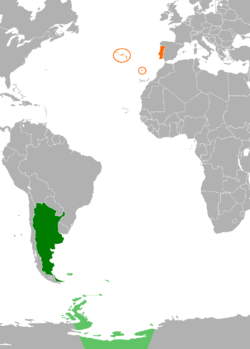 | |
Argentina | Portugal |
|---|---|
The current and historical relations between the Argentine Republic and the Portuguese Republic, have existed for over a century. Both nations are members of the Organization of Ibero-American States and the United Nations.
 | |
Argentina | Portugal |
|---|---|
The current and historical relations between the Argentine Republic and the Portuguese Republic, have existed for over a century. Both nations are members of the Organization of Ibero-American States and the United Nations.
In 1512, Portuguese explorer João de Lisboa reached and explored Río de la Plata, and went as far south as the present-day San Matías Gulf in Southern Argentina. Several other Portuguese explorers would sail along the Rio de la Plata and would encounter other parts of present-day Argentina. In July 1816, the Portuguese Government based in Rio de Janeiro, Brazil became the first country to recognize the independence of Argentina from Spain. [1] [2] In August 1852, a Treaty of Friendship, Trade and Navigation was signed between Argentina and Portugal. [2] Soon afterwards, Portuguese migrants arrived and settled in Argentina, however, Argentina never received a large number of Portuguese migrants as most preferred to immigrate to Brazil which is a Portuguese-speaking nation. [3]
On 23 October 1910, Argentina recognized the Portuguese Republic, soon after the start of the Portuguese Revolution. [2] In June 1947, the First Lady of Argentina, Eva Perón, paid a visit to Portugal as part of her Rainbow Tour. [2] In July 1997, Portuguese Prime Minister, António Guterres, paid an official visit to Argentina, becoming the first Portuguese head-of-state to do so. [4] In October 1998, Argentine President, Carlos Menem, paid a visit to Portugal to attend the 8th Ibero-American Summit in Porto. There have been several high-level visits between leaders of both nations since the initial visits.
In 2019, the European Union (which includes Portugal) and Mercosur (which includes Argentina) finalized a free trade agreement. In December 2019, Portuguese Foreign Minister, Augusto Santos Silva, paid a visit to Argentina to attend the inauguration for President Alberto Fernández. [5]

High-level visits from Argentina to Portugal
High-level visits from Portugal to Argentina
Both nations have signed several bilateral agreements such as a Treaty of Friendship, Trade and Navigation; Agreement for Trade, Economic and Technical Cooperation; Agreement on the Promotion and Reciprocal Protection of Investments; Agreement of Cooperation in the Prevention of Illicit Trafficking of Narcotic Drugs and Psychotropic Substances; Agreement on Tourism Cooperation; Agreement on the Exercise of Remunerated Activities by dependents of members of the diplomatic, consular, administrative and technical staff; Agreement for Scientific and Technological Cooperation; Agreement in Criminal Matters and Mutual Judicial Aid; Memorandum of Understanding between the Portuguese Ministry of National Defense and the Argentine Ministry of Defense; Memorandum of Understanding between the Portuguese Ministry of Foreign Business and the Argentine Ministry of Foreign Affairs on Political Consultations; Memorandum of Understanding between the Portuguese Ministry of Environment, Territorial Planning and Regional Development and the Argentine Secretary of Environment and Development of the Ministry of Health and Environment in the area of Alterations; Agreement on air transportation; Extradition Treaty; Memorandum of Understanding between the Portuguese Ministry of Justice and the Argentine Ministry of Justice; Memorandum of Understanding between the Portuguese Ministry of Education and Science and the Argentine Ministry of Science and Technology in the domain of Scientific and Technological Cooperation; Agreement on Social Security; and an Agreement of Cultural Cooperation. [6]

Bilateral relations between the Argentine Republic and Canada have existed for over a century. Both nations are members of the Cairns Group, G20, Organization of American States and the United Nations.
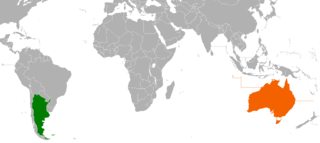
Bilateral relations between Argentina and Australia have existed for years. Both nations are members of the Cairns Group, Forum of East Asia–Latin America Cooperation, G20 and World Trade Organization.

The current and historical relations between the Argentine Republic and the Republic of South Africa, for over a century. Both nations are members of the Cairns Group, G20, Group of 77 and the United Nations.

Diplomatic relations between the Argentine Republic and Ukraine, have existed for decades. The importance of relations centers on the history of Ukrainian migration to Argentina. Ukrainians in Argentina form the second largest Ukrainian community in Latin America numbering approximately 250,000 Ukrainians and their descendants. Both nations are members of the World Trade Organization.
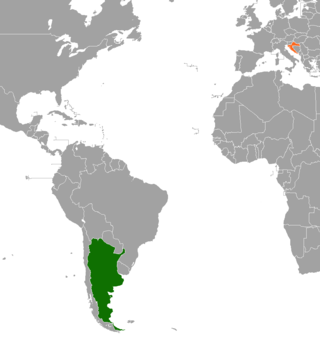
Argentina and Croatia both enjoy friendly relations, the importance of which centers on the history of Croatian migration to Argentina. There is approximately a community of 250,000 Argentines of Croatian descent. Both nations are members of the United Nations.

The Armenian community in Argentina is the largest in Latin America totaling approximately 120,000 members.

Current and historical relations between the Argentine Republic and the Russian Federation have existed for decades. Both nations are members of the G20 and the United Nations.

Diplomatic relations between the Argentine Republic and Hungary have existed for decades. Argentina is host to one of the largest Hungarian communities outside of Hungary. There are approximately 30,000 to 40,000 Argentines of Hungarian descent. Both nations are members of the United Nations.

Diplomatic relations between the countries Argentina and Lebanon, have existed for over a century. Both nations enjoy friendly relations, the importance of which centers on the history of Lebanese immigration to Argentina. There are approximately 1.5 million Argentines of Lebanese descent. The Lebanese community in Argentina is the third largest immigrant community in the country and Argentina is host to the second largest community in Latin America. Both nations are members of the Group of 24 and the United Nations.

Bilateral relations between the Argentina and Finland, have existed for over a century.
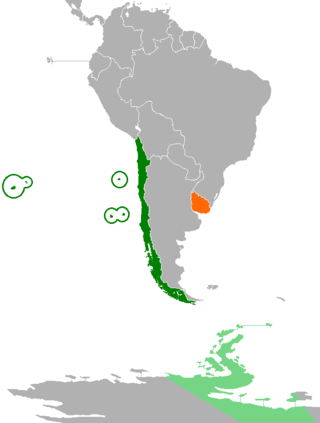
Chile–Uruguay relations are the current and historical relations between the Republic of Chile and the Oriental Republic of Uruguay. Both nations are members of the Cairns Group, Community of Latin American and Caribbean States, Group of 77, Latin American Integration Association, Organization of American States, Organization of Ibero-American States and the United Nations.
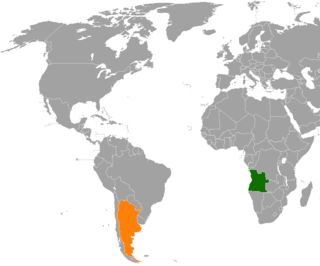
The Republic of Angola and the Argentine Republic are members of the Group of 77 and the United Nations.

Diplomatic relations between the Argentine Republic and the Republic of the Philippines, have existed for decades. Both nations are members of the Association of Academies of the Spanish Language, Group of 77, the G20 developing nations, and Forum of East Asia-Latin America Cooperation and the United Nations.

Portugal–Uruguay relations refers to the current and historical relations between Portugal and Uruguay. Both nations are members of the Organization of Ibero-American States and the United Nations.

Brazil–South Korea relations are the diplomatic relations between the Federative Republic of Brazil and the Republic of Korea. Both nations are members of the G20 and the United Nations.

Mexico–Portugal relations are the diplomatic relations between Mexico and Portugal. Both nations are members of the Organization of Ibero-American States, Organisation for Economic Co-operation and Development and the United Nations.

Angola–Mexico relations are the diplomatic relations between the Republic of Angola and the United Mexican States. Both nations are members of the United Nations. Neither country has a resident ambassador.

Current and historical relations between Argentina and Azerbaijan have existed for decades, since Argentina's recognition of Azerbaijan on 9 March 1992.

Brazil–Tanzania relations refers to the current and historical relations between the Federative Republic of Brazil and the United Republic of Tanzania. Both nations are members of the Group of 77 and the United Nations.

Chile–Portugal relations refers to the diplomatic relations between the Republic of Chile and the Portuguese Republic. Both nations are members of the OECD, Organization of Ibero-American States and the United Nations.